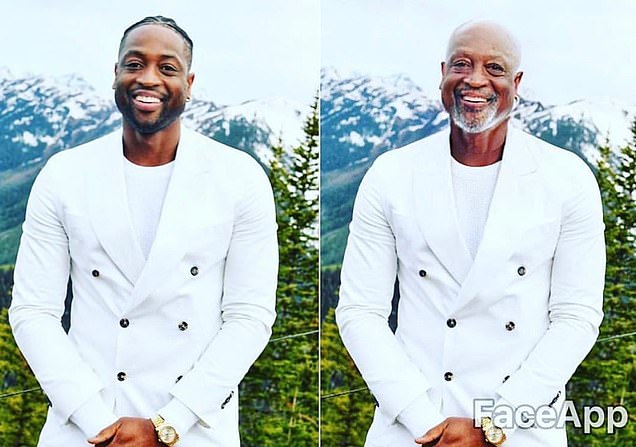[ad_1]
Another popular face-swapping app is generating backlash after many users called attention to potential privacy concerns.
The app, Zao, recently skyrocketed to the top of China‘s iOS app store by offering users the chance to insert their faces into film and TV by simply uploading a series of pictures.
Despite its popularity, patrons quickly turned on Zao due to a strongly-worded user agreement that gave ‘free, irrevocable, permanent, transferable and relicense-able’ rights over use of its their content, reports Bloomberg.
The company has since rolled back those terms, but many have voiced their outrage with the idea that their content was now owned by the company — a relatively unknown entity.

The deepfake app, Zao, was download widely across China over the weekend, but quickly became the center of controversy when users found out that it was claiming to own pictures uploaded to its platform. Above is an example of Zao’s abilities.
Zao, which is currently only available in China, works by having users take pictures of themselves moving their mouths, or making other facial expressions, and then using the data to project their likeness onto celebrities via artificial intelligence.
Quickly, posts showing the apps’ many creations flooded social media, with users inserting themselves into scenes from the popular shows like ‘Game of Thrones,’ ‘The Big Bang Theory,’ and combining themselves with celebrities like Leonardo DiCaprio, Hugh Jackman, and more.
Many of those same users, however, were disheartened to learn by uploading their images to the app, they were giving up ownership rights to Zao’s owner, the Chinese company, Changsha Shenduronghe Network Technology – a subsidiary of the messaging service Momo.
The company has reportedly changed its agreement since the backlash, saying that it will only use the head shots and videos made with them to improve its app or other purposes that have agreed upon in advance.
That apparent shift in policy hasn’t stopped users from lashing out at the company, however.
Bloomberg reports that the app’s rating has plummeted, dropping to 1.9 stars out of five after thousands of negative reviews.
On social media, users called out Zao for its attempt to claim ownership over users’ information.



Likewise, the China E-Commerce Research Center, a consumer advocacy group, has urged Chinese regulators to look into the app’s policy, saying that it ‘violates certain laws and standards set by the nation and the industry,’ according to Bloomberg.
‘We understand the concern about privacy. We’ve received the feedback, and will fix the issues that we didn’t take into consideration, which will need a bit of time,’ Zao said in a post sent out on Chinese social media platform, Weibo.
Backlash over the app reflects a similar case from earlier this summer when a viral app called Faceapp was downloaded and used widely by people in the US, the UK, and across the world.
The app, which before being made aware of certain privacy issues in the app’s terms of service.

Faceapp suffered similar backlash after users uploaded their pictures in hopes of getting a glimpse into their future, elderly, visage.

Dwyane Wade was among the celebrities to post his own fast-forward image using Faceapp with the caption ‘Grandpa Wade huh.’
The terms of the user agreement essentially give FaceApp the ability to use, modify, adapt and publish any images users offered up.
‘You grant FaceApp a perpetual, irrevocable… royalty-free… license to use, adapt, publish, distribute your user content… in all media formats… when you post or otherwise share,’ read an excerpt from its user agreement.
Users were also skeptical of the app’s Russian origins. FaceApp is owned by a company, Wireless Lab, which is based in St Petersburg.
The use of algorithms to fake and manipulate video has garnered an increasing amount of attention as of late as skeptics warn that the technology could be used by bad actors to spread misinformation and even influence political campaigns.
Deepfaking AI has already been used to create digitally-altered videos of world leaders, including former President Barack Obama and Russian president Vladimir Putin.
As regulators and technologists work to get a grasp on the problem, however, the sophistication of algorithms capable of faking videos seems to have expanded.
In a recent example, researchers from Samsung’s AI center in Moscow demonstrated an algorithm that can fabricate videos using only one image as opposed to the typically large data set required by AI of its ilk.
[ad_2]
READ SOURCE






